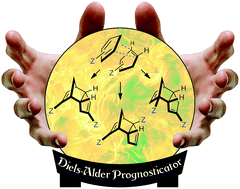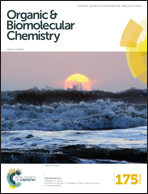Revisiting the mechanistic origins of Thiele's ester dimerization: probing the reliability of predictive models for cycloadditions†‡
Abstract
The Diels–Alder dimerization of cyclopentadiene carboxylic acid (or ester) affords only three products out of a total of 36 possible regioisomers. In this Communication, we compare two competing conceptual models for their ability to rationalize the selective formation of these three compounds. We find that calculated ΔHf values and orbital energy levels are sufficient to describe gross reactivity for the system, but that orbital coefficient arguments (and frontier molecular orbital theory in general) do not reliably predict the regioisomeric outcome for the reaction. By contrast, Deslongchamps’ radical stabilization logic (a consequence of the bent bond model of reactivity) correctly predicts all three Diels–Alder products. We anticipate that these data will stimulate broader consideration of radical stabilization effects as a predictive tool for cycloaddition chemistry.


 Please wait while we load your content...
Please wait while we load your content...